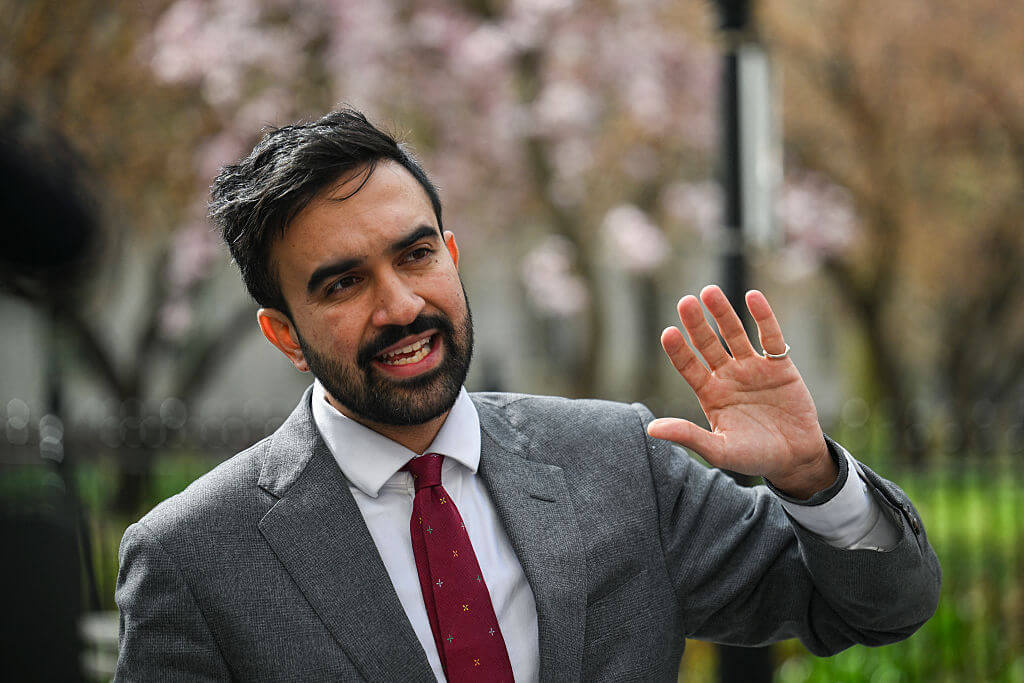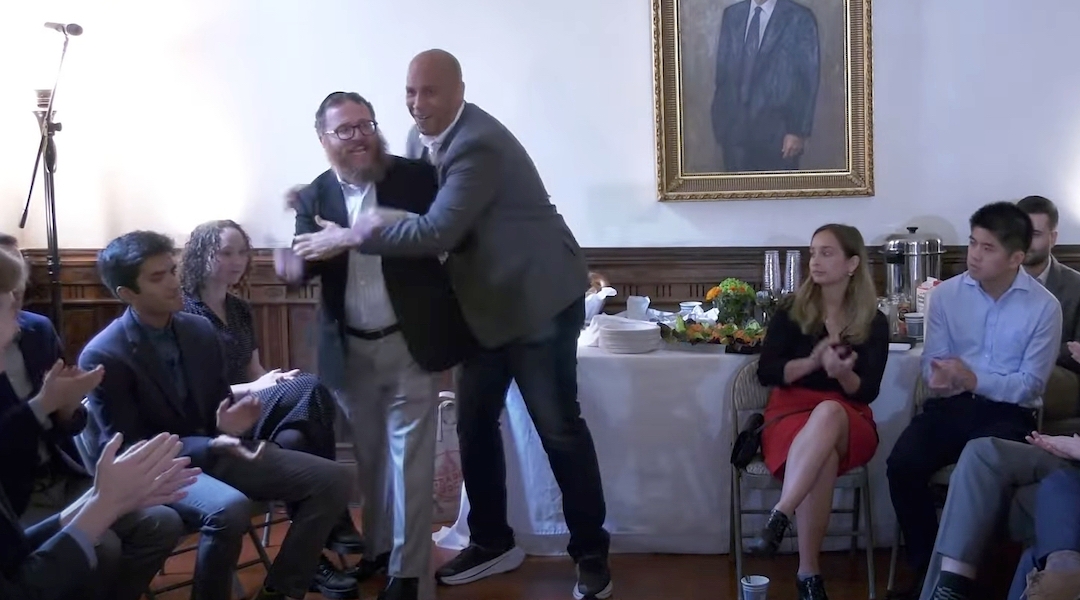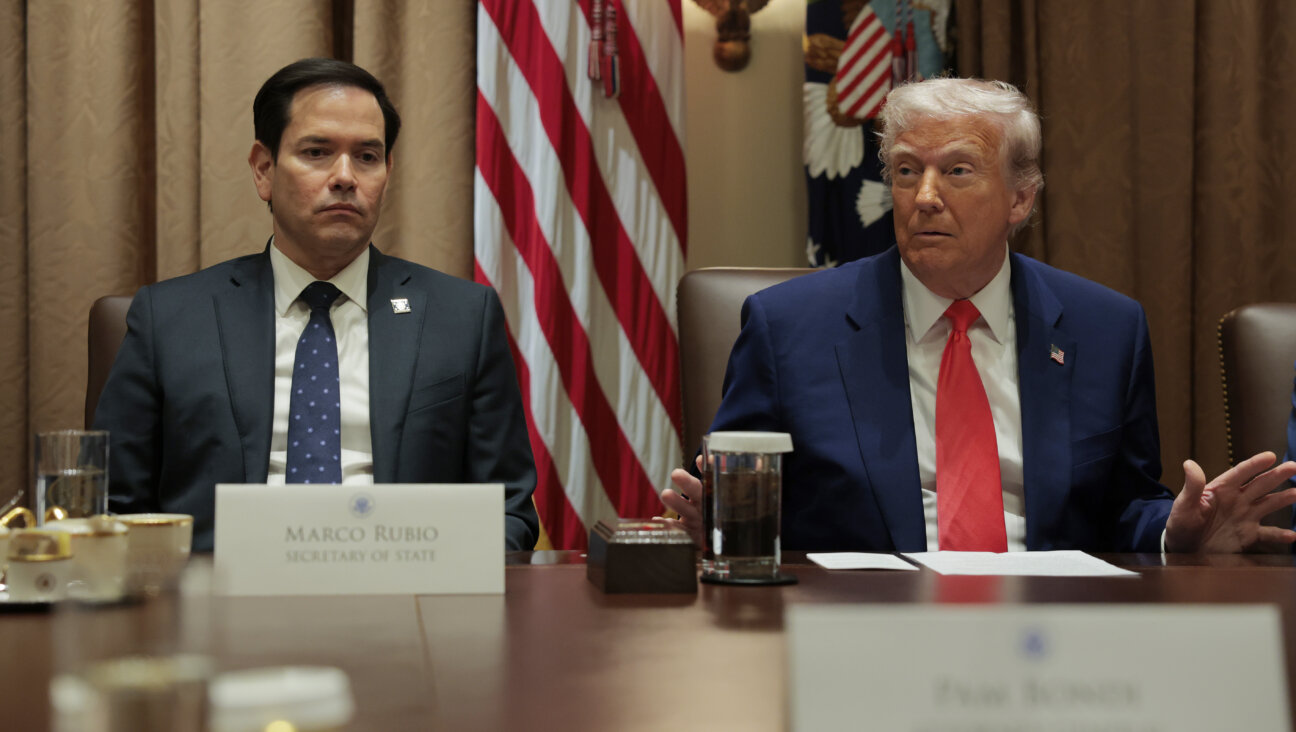Top Rabbi Calls for Leaders To Stay Out of Campaign Fight
As the leader of the country’s largest synagogue movement, the Union for Reform Judaism’s Rabbi Eric Yoffie normally tries to stay out of partisan politics. But in recent months, as presidential contender Barack Obama has been subjected to a wave of public criticism from segments of the Jewish community, Yoffie has found himself increasingly distressed by — and willing to publicly counter — remarks made by other Jewish leaders about the Illinois senator.
Reached by the Forward late last week, Yoffie strongly condemned statements made recently by Malcolm Hoenlein, executive vice president of the Conference of Presidents of Major American Jewish Organizations. A few days earlier, Hoenlein had voiced disapproval of the tenor of the American presidential campaign, and raised eyebrows both in Washington and Jerusalem with what was perceived as a swipe at Obama.
The current conflict can, in a sense, be attributed to differences in personal and political styles. The two have clashed in the past, but given that Hoenlein’s remarks followed a number of statements by Jewish leaders that were critical of Obama, Yoffie’s response also underscores a growing desire on the part of many Jewish officials to tone down some of the heated rhetoric surrounding the candidates, even if that means speaking out in ways that are not generally preferred by nonprofit groups.
“I think we’re stuck between a rock and a hard place here,” said a Washington representative of a major Jewish organization who is not authorized to speak to the press and spoke on condition of anonymity. “Most Jewish organizations are very sensitive about their charitable status, and they can’t be seen in any way as endorsing or rating a candidate.”
The recent controversy was set into motion by comments made by Hoenlein during a February 12 Jerusalem press conference.
“All the talk about change, but without defining what that change should be is an opening for all kind of mischief,” he said, according to the Israeli daily Ha’aretz.
“Of course Obama has plenty of Jewish supporters and there are many Jews around him,” he reportedly said. “But there is a legitimate concern over the zeitgeist around the campaign.”
Although the original Ha’aretz dispatch from the event suggested that Hoenlein had criticized Obama directly, Hoenlein later said that he was speaking about the presidential campaign in general. Yoffie, however, who was also in Jerusalem at the time, told the Forward he felt that Hoenlein’s comments had had a profound effect on Israeli politicians and that he was deeply troubled by them, despite the subsequent clarifications by Hoenlein.
“I was a bit stunned, and as I walked through the Knesset and heard people saying that American Jews are attacking Obama, that made me more uncomfortable still,” said Yoffie, who, as the URJ’s president, is a member of the Conference of Presidents. “Everybody who read those comments took them as an attack on Obama by the American Jewish community, and that’s why it’s critical we need to avoid these comments.”
Hoenlein spoke in Jerusalem as part of the annual leadership mission of the Presidents Conference, for which he was traveling in Europe and Israel. While he did not respond to the Forward’s request for comment, he did praise Obama in interviews with other outlets.
“All the candidates are positive about Israel, and pro-Israel people in Chicago who know him well speak highly of Obama,” Hoenlein told The Jerusalem Post.
While he declined to address the specific remarks in question, Abraham Foxman, national director of the Anti-Defamation League, said the larger debate over which presidential candidates are friendly to Israel is “counter-productive” for the Jewish community.
“I understand why political advocates try to make distinctions between candidates on various issues, but I don’t understand why the Jewish community is buying into the idea that there are significant differences on Israel,” Foxman said, adding that there are “nuances” between the candidates on broader policy in the Middle East.
Yoffie expressed a similar view. “When I’ve been asked by members of the Knesset do I see major danger signals when it comes to any of the candidates and policy towards Israel, my answer is ‘no,’” he added.
In the wake of such divisions, Yoffie said it was critical for all Jewish leaders to realize that “nobody has the right to speak in our name.”
The Forward is free to read, but it isn’t free to produce

I hope you appreciated this article. Before you go, I’d like to ask you to please support the Forward.
Now more than ever, American Jews need independent news they can trust, with reporting driven by truth, not ideology. We serve you, not any ideological agenda.
At a time when other newsrooms are closing or cutting back, the Forward has removed its paywall and invested additional resources to report on the ground from Israel and around the U.S. on the impact of the war, rising antisemitism and polarized discourse.
This is a great time to support independent Jewish journalism you rely on. Make a gift today!
— Rachel Fishman Feddersen, Publisher and CEO
Support our mission to tell the Jewish story fully and fairly.
Most Popular
- 1

Culture Trump wants to honor Hannah Arendt in a ‘Garden of American Heroes.’ Is this a joke?
- 2

Opinion The dangerous Nazi legend behind Trump’s ruthless grab for power
- 3

Fast Forward The invitation said, ‘No Jews.’ The response from campus officials, at least, was real.
- 4

Opinion A Holocaust perpetrator was just celebrated on US soil. I think I know why no one objected.
In Case You Missed It
-

News These are the most influential Jews in Trump’s first 100 days
-

Fast Forward Nike apologizes for marathon ad using the Holocaust phrase ‘Never Again’
-

Opinion I wrote the book on Hitler’s first 100 days. Here’s how Trump’s compare
-

Fast Forward Ohio Applebee’s defaced with antisemitic graffiti reading ‘Jews work here’
-
Shop the Forward Store
100% of profits support our journalism
Republish This Story
Please read before republishing
We’re happy to make this story available to republish for free, unless it originated with JTA, Haaretz or another publication (as indicated on the article) and as long as you follow our guidelines.
You must comply with the following:
- Credit the Forward
- Retain our pixel
- Preserve our canonical link in Google search
- Add a noindex tag in Google search
See our full guidelines for more information, and this guide for detail about canonical URLs.
To republish, copy the HTML by clicking on the yellow button to the right; it includes our tracking pixel, all paragraph styles and hyperlinks, the author byline and credit to the Forward. It does not include images; to avoid copyright violations, you must add them manually, following our guidelines. Please email us at [email protected], subject line “republish,” with any questions or to let us know what stories you’re picking up.














